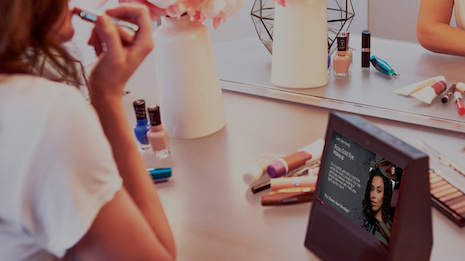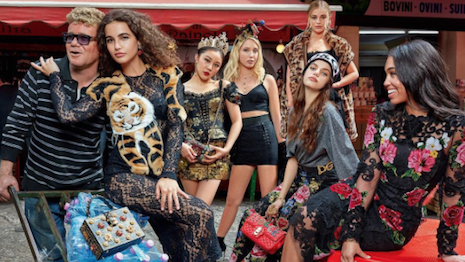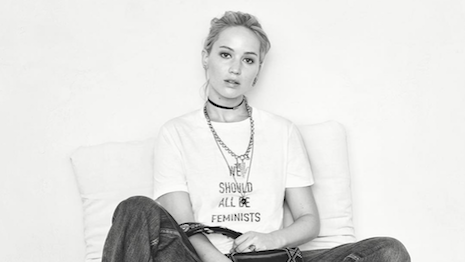In a world where facts and figures are increasingly called into question, luxury brands will need to lead with emotion and values rather than rationality to succeed.
According to a new report from Positive Luxury, while storytelling and truth were the buzzwords of 2016 and 2017, respectively, 2018 will be dominated by the concept of “influence through emotion.” As millennials’ spending power grows, their preference for companies and brands that strive for environmental and social good is moving the needle for luxury brands, making CSR a boon for business.
"From my perspective, the luxury business is edging further towards emotion as the number one influencer," said Diana Verde Nieto, CEO of Positive Luxury, London. "We’re seeing the huge power of emotion influence everything from politics to retail, and it will only continue to dominate.
"The digitally-savvy, socially-aware generation is reaching maturity and demanding that companies prioritize sustainability," she said. "But only companies that do so in an honest, authentic way will be able to engage this new audience.
"We saw an example of this in action when Dior’s ‘We Should All Be Feminists’ T-shirt sold out in a matter of days – because it enabled people to express their commitment to gender equality."
Emotional appeal
Positive Luxury’s 2018 Predictions Report “The World is Ruled by Emotions: Breaking Tradition the Millennial Way” lays out the key disruptors to luxury business as normal.
As emotional connections become more important for brands, the means of measuring consumer sentiment are also growing. For instance, voice-activated artificial intelligence is expected to evolve to be able to detect tone of voice, while the iPhone X’s facial recognition means that users can integrate their own face into emojis, adding a personal touch to the cartoon expressions.

Coty Inc. looks to the future with Amazon's Echo. Image credit: Coty Inc.
With increasing connectivity, marketers will also have access to more data, providing a more thorough view of the consumer.
"We’re already at a point where luxury brands have realized the value of effective data analytics and are using it to position themselves as a service or problem solver," Ms. Verde Nieto said. "Going forward, they can adapt even further with the advancement of machine learning, as this will enable them to delve deeper into what consumers care about.
"Luxury brands can indeed reconcile elements of tradition as they evolve to meet today's demands – companies like L'Oréal and IWC Schaffhausen are marrying traditional values of customer service with technology to anticipate the needs of their consumer and further engage new communities of brand advocates," she said. "And it goes even further: by adopting the Butterfly Mark, these brands are gaining meaningful insights into the issues their consumer cares about most – whether that's responsible sourcing, diversity and inclusion, reduced carbon emissions, and more."
In the emotion economy, a number of trends are rising to the forefront.
Consumers are favoring the word-of-mouth of influencers or other customers over top-down advertising. Individuals also show a propensity toward being a member of a brand community, with 50 percent saying they would show loyalty to brand they felt a part of.
In retail, experience is key as brands establish opportunities that go beyond selling to reach a millennial audience that is more focused on memories than acquisition.
Additionally, as the consumer becomes more globally minded and mindful, brands need to follow suit.
Positive Luxury stresses the pros of having sustainability at the heart of a company, such as being able to attract talent and clients. College students today are opting to take classes in sustainability, and those under the age of 30 will make up half the labor force and customer base of the luxury market by 2020.

Dolce & Gabbana's fall/winter 2018 campaign, featuring a millennial cast. Image credit: Dolce & Gabbana
Due to the financial implications of embracing sustainability, whether through animal welfare or waste reduction, the report rebrands CSR as CSO, or corporate social opportunity.
In certain cases, where the government stalls in embracing sustainable action, companies can take up the cause to their benefit.
For instance, jeweler Tiffany & Co. called on President Donald Trump to keep the United States in the Paris Climate Agreement.
The Paris Climate Agreement, or the Accord de Paris in French, is an agreement within the United Nations Framework Convention on Climate Change (UNFCCC) to deal with greenhouse gas emissions through mitigation, adaptation and financial policy starting in 2020. The Paris Climate Agreement was negotiated by representatives of 195 countries in 2015 (see story).
As word of mouth becomes increasingly important, establishing practices that attract consumer advocacy will be key. Consumers today have more tools to broadcast their approval or disapproval of brands, and like-minded individuals can more easily find each other via social media.
Consumers’ interest in sustainability coupled with the increasingly emotional decision making means CSR initiatives needs to strike an emotional chord with consumers to succeed.
Millennial minded
Some luxury labels are ahead of the millennial curve with sustainability central to their operations.
For instance, Kering-owned fashion label Stella McCartney inked a partnership with a biotechnology company to advance and innovate the manufacturing of textiles.
Stella McCartney will work with San Francisco-based Bolt Threads to push fashion forward in regard to exploring alternative textiles and manufacturing techniques. Bolt Threads' approach aligns with Stella McCartney’s dedication to sustainability and eco-friendly fashions by creating only fibers based on proteins found in the natural world (see story).
If the fashion industry continues to improve its environmental and social performance, approximately 160 billion euros, or $174 billion at current exchange rates, would be added to the global economy by 2030, according to a new report from Boston Consulting Group.
BCG’s first edition of the “Pulse of the Fashion Industry” report is in collaboration with the Global Fashion Agenda, a nonprofit initiative seeking to transform the way fashion is produced and consumed. The report is a temperature check of the fashion industry’s environmental and social performances, two concepts that are becoming increasingly important for consumers as they shop (see story).
"It's become clear that CSR can no longer be skin deep," Positive Luxury's Ms. Verde Nieto said.
"We’ve identified that millennials view themselves as global citizens with a responsibility to live sustainably," she said. "To keep up with this shift, brands must have sustainability at the heart of their businesses; they have to engage with the millennial consumer authentically.
"Brands absolutely must communicate their sustainability actions in order to position themselves as industry leaders – this is the only way they can create and harness a powerful community of ambassadors and advocates. A brand’s ability to spark an emotional connection with consumers, especially around the social and environmental factors that are increasingly important to them, will be imperative to successful growth."
{"ct":"vGz7IbludCf397TAJaJF6MAhep4D9f3wOPbozBgNHz\/p\/dOWLp8fmcCjSOuB2fE+oleg2ajfZ\/WttXCifJ5xbT5gIyQVJmslToioGfmDsZcyklh+38xgT2L8E1DsRIRfVYCwZiF7JXI4XtNpXeRoHU1dkMSKoR6bZwYS2nGv0OeiSEkkl5F9qBGKchcbsvC4Yrb42um\/Y1a4PMzJaJ9y+1VcibX8JsSI32O2l2lYgHfogZtuCztuhzTqEXA22booM8J9TSkSNqypreL\/a90sERBZCbhDkdmNXfvhUNLVocxtW4ngay+z72vl1QA6ROd4tMCeG\/UytUKuRf03jt2Rk3Wk+6HG8qA2qyWAT7sm0r361RYXVoG1XezFissIUp64XTOPNmpxfoQWG2wfehqCyA\/OLu8\/bGNiwPpgay7d7C1JjcvcMuKWOieN28h25IwMFMiLXm8MGZxsYGqIludDz+6ZzKQ5FREs+6WkVk+1dVM9+RzPgwoBuChJPDI\/bdA637LtedUf1RU5OV3U3JFIt5JkyJ6CB5MnQcGaaemhz\/boONgWaQijwmLOzcLQY7K6XUox0HfTFLuLw9M5hVrFDlFIWDAVWpdCVntUyhcxDIcrSDEXZ2Vrs4vIuNgeKO2\/eW+x1QbVW1vyVn7ijnQGTKENVklLdXKbijQpHD6PkXZmXI82JRw2BRFucxJ19HjiW\/2BJ1puop5p6ojvnD0DGV84ZIpxKCwJwRtSqyMScRe+FOgSFiZc0E0Vq4eUvg+CZq2M+RQv\/LHoJtF03Vkn3jYGgfJn9zy8AzJoitCD5HqKyWhfh86SrXHKbU5lmh+C8JSIgnqeqH4WP16bmo3uaO+E1lvZBNq8Fvpxyu\/q2RL6fKl7eJB1rOBVh1bBi+3te9cjRTrsgm5xEg4njGNmmGfvw19y0bkpuCw1H\/eJFCrsTKyCV2Db8d0nzj6GUxzcMhLLzAKEednJtyuQ1q9QhNV8eJMFiEEzclVgHNiGZl+bKXT+XjliEurNWrryooevq1cNPtYkQfgWjBVmZavuQdQcg1nM7Lo0E2EqmBqNScF6C\/SYffe+tYU4\/aEIhNYhhu+ZUYjRVdiGix2BCE43elu9tH67he7dtYFtEa65epUoz\/4HofmlhZx19P+dVbujShjnWgVSuYYIJjCUiZb7aAqwJ8XwbYga97Xz3rRSxEEXr3KwU5cRbv90rqGxZQyJGFMTbFhZeQg5txOqG2+fHXxOplDtb5fsGsZE8B7Cjxr8L4QPC+OWaQlOM9lafraG3UUmFRzWiv93oCimk3WKIIXmz7sDBc6bfA+DnVle1bOUS025BGqSpLkQwXxrwmMY4ht4WFp2f+ckmFHxfiincq1tYI4mxvQll7JCvOtZmao84TT5t\/4vHB0YbRb2JrjZh7G7eXHONXVa7fXw1Mojmb9i30w9S5DqW3zX6nqFSUopFIx4pbyHRUuC3jqA3VJ9jI+KOAIAukOu7CnZX7Ta\/hUxD1DyHSxWGkW7OisH7zqOwGUe2aiJB\/hSJCCkHAF9EcVYdZTcnN8kvFBkCKJM0Zvqc5sa8Lo6fVi+aJJLUw+UQC3MQ0iJeBNh8yzuRw2qw9bfaGp7Bm\/zNJ4xHozCWlesOzRrjdK+CmchispKRi5UPkCtbJbVmDQgtIoAP1ShESGLOlcLn+UtKCumqYFE4PChha0OnGdhq22rj4aWMW7jvdjqY79OYOrUI0mymnyXtSG8uw9U61FFsrIGQl2HTGn6BLKGQnd3nC2Tptky8O4H1tClOoeMMkmrswtvAjfp4XQglHryLI7bn\/lA7ARqCOEtVuTn5A\/T739\/nFBuIXIZIh5FOZig0l0j1WOZzgHHIGsdyAVDC0Kf6Vx+kpMdWyigJ6B8mHHyb7BRJ9kxwBkVYN20SbopuAwpbuoA3P7hpQoHBa352fdos59NTTGso4KcgfwIJD854iBIESOWrCPWzYc2J+IAG3BoTJbhdwP4GqDE81ZSMpyK\/MeD40Bi1UcePGfVwxjOmwZaMi3Eq9KjaFxHB6wQQL5Lu\/6deQwLcEmdzliHqpd4mTRpoqr0XJILWjXhZEgY0QZTniwsG414RxaIGA6wjzWjau0vztNNgJUo5zwbPwOVaDFYB2wKkk0n\/\/D2kBNNaBU9dq4YushWidkP2oSGgDWwrCTyIcCl+4ZHhxipoD9umewjmRGwBbdSZx6R4F4FcVrt2XZ5lxfxyp5nusDWqw7tIb0GjzxE0Fr1bK7ujrz1UsE9lzKzR4Rgp7ALs2hyaQjUOXaonxFGhkAe2jVeAMUUZhR3BZNPrfW1Zq1qMOkLdmr6ZeMVgsk9xiwnjzlVwqEmTkRpyf9bHVe5iALk1EzkzmOxoTs08K0mnE9sa8jsxB7E62TesLQwzBh4exHPi68dmfVvj6buGUxmIGQ0UvG\/SmF7kRgH3P7C2\/pijX83U8QNXvSTAXIPpHkpvUYNFVideJBZgdU\/uV7aq3h5rRtEJvrL4nLRBv7oTurbOrvfZh77d7Lim0q1zrYyb9Xq7fxpEIcUxDHglwpPI4ymngaP9PhfnS8olj+1QTuKX7+SN0DeU0D0iiT1LrzS0FavSLRCWIh6zu10p6Yl8UVFAyLB\/ImPBFP4JbE3QQyB8qdNZzsK3wWXnRAy6vkzGQ\/y60IWZf76YVUISyYSSb8ZKiMjJPYn\/AT3dQa9px5y1mGl5ulKhB\/0j1SWL+TZGVHSkmOhP0mGRrbclo3Nw082zow3C7+FyP3nQKqraSVPgoxrJQqk1epqgT9Z+q2NmKM4qxMbNd0hC+y+SmLKrzAE1v\/qx5FjhbPFMSmKqEkQQu2EOIJ19K+DBe507O86kq8endH0t4ORno70BbXjdk6dMZFzmn0WVW62BwfMt\/So0HcK9CgwT251MYCWK6BLWciqi5hOZSnv8KVVe20K9IK8EJy1bIQYS8hMhIpkPunGd8eHxYw\/GyrnIECD8gK4f4KpQuBvjtIj6xoYaoowJaNBN7Im8lxW+ezqLQptXeinGSBcu8PLHw7jKOTftkRwebwmpSncaQXYzhynpKMG87O+Nvjm3ouqklcjvaI4VO9K7weIFnXaKcKTzgyQuG1VGge4HoeBsVe\/oF1b0Rd46U4bb8mf\/W2mnNkNAAdFVMnxA6QF7M0sqPpqIZZpRS7ZZQLMBZYU5VvpiNS5+IYwFTCC7VlMmCoK6rXCKc52Au+zdWwn4sVH9Crm+z+60\/rQjIA58dA9j7e5vv7IoV55E9ds1\/BCPsSyLNtDPq4DNgeDs6rk63Nzd6z8cyTfchwXI3Wt8s5mc5waaoA0tJ2gMVQ525ipuR43uQw4CS2fB8EXHHv1rJtaRt0hRKCz+TOEaflxuTF5oxgjttLFNCPp0Q+nKAgEkapXjM4Jz8USw0vyzSM+EcYOYbuaDHoLcgRkiZrBz5ndwdGgWlQkfHO9X8\/9PBueDo4j4OiJverEXU1SZFvdCLJuZWoFsoHy6xwMEjtKGdO+MUZ93dtZUzLS085hCzGwca7lHNMiRlTrg5GS6dxDoTCSKKYeLOyaK1ZD7E8L1wCZ70A13inPM8UV73cmjl7ORtGeHNjO31M9FPP\/daFUvA8R+f6JIB21QyttZ0E5bGGdsklkmsHl0uzYdKAUHDdjAXZUniqpjTVhyELKJbzVnJB7iJ1UZGiLdh1GpUZv8LkK6bnIbTy8J8P28x\/2K2palSeWfzyjzQmQNrge9aFicOGB99OVz5vWrACGpqsykvyEkV+CH+bRY\/YCFO0vZgne76fmYQPFyrMo5Ljn8F+9YEVqlUmCwWO4xU8JM\/UfMoGg\/O9ToAtPnppCHsUBYsQlsohjzLrSf7hCd6GBMrGh4wd08UtFxdn1rlG9El0yddBThsqDJrIN5TE6CQXS3Tw66YpMCJqXxwEYL1sCiz\/eHl\/U8kV2jP4n9NSkMlZtfpRoeQRiHjEUcceu804lAACBQF0IW3DEsdwzoeh6oGufXOPM+1ydCcKiZ7j3W76WuNq7bmfvOvq88\/IMa8QYOZo4G5+TZfpL2c0digI7xQ6HebmiyXad9pVD99ChWqEU68Vr7ZQyuVT020MCGxLwABSUMFJ8NzBrHYCHebi1Whf5tRDIewGw9z9PL5\/4Ii3Jp17dK1qeN7Sl3xJ0hm0JDPuXsv99kx8dK2oayPyKQjOgVt7nVFvdSFJxzftM1hlMARO6CHf\/XC6ib94Em7cYWAX9S1ieF8fSPUmQyUNY75iLODFtzLZS+6KIXjLDvALE1MvqSZvb9W3Gw\/CRFvRi3UGLM0PO7FUD5kEDF2zzOXfedF+jTVV\/Aoe0cMSvjpFEbVwcxaqkzYYhh73YAWVQVKzHJtiHvWiNNB+YY8MEWUTBpd3DURyvip\/ApcgVuqBBIMAJ4eU1XV4jbCRpjQmmd2LPxd8yIEgz5j4MmDQmMJM76zg7tBWZ9rgv+DsIjo1C22bXiHJpomWD\/8kZsEdEGDWA3uQKejfhFok\/QCa+y\/0ONOGjRP\/JW826O6EfWQkRItCJAqZAN\/YAlBSWTIQ1PfoUCTuro0G5j+syTNjFMUAnkJcbaH51LzxdZhrTmQ6HPqTH9clq5NDet60Zx1A2tyNErFhNPBW08m9Ya6mRGm1yAgHuV8\/zZwY3r\/XOQnAcu8ogrGdzq7ZFbPgkiPMHVPTE8px9sp4LH7M+dToarDsZRAfuuXI7+PTygozcFxRtcGg\/8YjnPgcg6FWnahxFnG56OYIhtYvK\/\/n4p58v+ZLdZlZHCtrPXjR9KwVBlHRT+iBumixIPJIiqriTZW9QUVMfweduSbcevRxxV9Ltd2onSXbRgp4pL+ik6IcKhDhcFkZvkvM88U6hws7lqqh5kx0nk5GiLp09\/f9D1QzDaA8vsxtvJVD1HBKpJcholumrH+VZcaUDa4F9bYj2OGrRjTiJehlj+VmZ9n4oUJUc3ugBWoUj\/r\/RAUscjMZ0vfJXMWYIrQKxYOoJy+oywqLOGDPkpjef5eVXGkZL5agXxWLRDeWc7U3mSxGeeCppVGe91zupJyPjoKary9WfMOyVf21vGCyZBfXSDgfXRZ2us7chlhg3v73f7f5SVsoycCRTpRG9IGJ6gtmyEPb0e4FzNaGCOKrdO9fFaUgxN75BPFN8Ok7h1Fmhgsunnk1i+GDSwMpjthp6N\/YnTgQ8VdKbO0veOmd12v\/WzynJkXPQwvQyhSE5PSuFXOGoce03P61U0EwguliUmMWfyqLD1pTgNVOYC5nRyJnGCOGMU6PMCpIPEXgdRipsFG+vACQsjCeZFpoGV9unZKHXQ2GENfxYAd6LRG+T0FM8rpgZGM4Fd9aUuas7saAYChvm\/hjbDr6I2Y5tuqMk+cV271z\/xU\/6oS58aJy+KZjOHHHjf9p9jQcgBSqsbPyDIrINcBhkijb7GgAt6RgJojp\/xa46TPXxv79zAjIuqLC2X\/vlmJTEd41q+WTEZ15Y4rUFesB2FUubvhrmR+YHxm6xELUc16oHZq4VB2PgM02J+G4x7jBthU3geza+yFJFapIvWIFyc9MfAP6SPC9l\/V5CYrmI81CEcwYXNg5tiBCHO2SW5h5FLePCMOBlk75Ookm9lJNzXcMwIXggdQEVBkE\/O77YWesdBZFXgZdv1phpc8aMN1DUY7EBJ0AtMJdILwB\/SqCfKjxDZN2JLtvhIEFAsEqn4HUg362NlOCdzPoCvZLaBKDpQN5pAD6okZblb1axqR+cKXOcnZPTpDYIGRV24+wr5+bsdU0jDnF\/mpJGrPeDu71b7P55L062xiFYByyz8THHOvpTtO4GoQbYmkRJj9xEISjBhQfvFywJSbTECdu1CpPDYwc\/J4vD0EeiBoxAbVx9lqZ\/nLI4iM03+\/+kDWCQoK8qyQcVH3yHwGi2ls87Yr3usA\/zALI8kI5XlJKAA4niBbA0Rv49ObGxuHylA\/iCBpceVyJxJiaUOc6B7GVQrTm7VEZd7H9F\/DB\/cP5LXXVS5gnUEOERxWWj5cXji77tcXh\/ugVcZVcGYgTGrsJVaS3Ah2I9QCAMPjwqwz\/BwJndJu3hHPnOo8b9HyAa8HsZCj1js7FePwkWXq3OT5qgP4pf10hF9MtNopPLbJT4EJnRsEftYzcyQYUgw\/tQkDMVIjERKsr2syFoMWrkDdgmw9AUnIbARlsnJ+yJF2JstS3Bz\/CDIfxBYIge2cxzg9UpSjjw7pzM1H9gmdjXQGuEVtdbettBP1h4dFmxNqHP8QBIIMHWWPhDWzPu2NKFRtrYHiVqqtgwFBs4IhidQW9c+e9WSGG+zGxudZkSQ5iYgvBwMyZTSxfNeT17UqQlR7IunM6U\/CP5PUXeTrTHHw2mryt8fNmidkxKNtLTUVSE5a5\/8SARjdx36KcuZnOfgCf99Zy8TV7B4kpiTHgTv\/afrpjaLSUNj5kQ75TV4uYQDIO1XyC1AE3B3hJNakOckobxI6Dm67SzBDjqDYSR1IkomNcjxqN5vcw9fT\/p7PMQk+H40bfGDmd5n5UOkt\/UWVKsm2bRnb5XOktzysXTn6+NZi8edo0Pmb+zrk63b22fDa9K6RB208HFIZ3Os6RtssaaPr1cRgP5Ryxhq8d4Ja8cinIqKcsqL9eyCHP3E8rt7qxTVkuyG8Upo0wcIPNiY5a8GW2L65Vl+N2uuh4KZ9wir5eLP3pMInxqPrs8bz4RAOcEocNakRXho2RJcGznbhDoTQE2pYuHk5uYljX6byehK16GykNf5QDPDwzPtR8JiDH0oANAA0Ao2vQ5plj9h8x6hxQpmSDNQffpJXtBx4d05xyyqOXw6j6Cgf1bM9KZunWV9KNlrXKidUb59skdQNyzqzaCWwhJyeQt97vPlNx9yAGsDrys7ylyguWDjImAQZFWZfFfEJLqENsG1RYTRTIkf28Urb\/scqAAIiSjLYzbqRyU4HtrlABaiQM0jUZ\/vphYGuSilqcW3VISim8QxXaBNmlp8HP+fm9SadqthwPTWOME37zpQP5YHoLmFWN4qYq13EVPjDA531+zydrZCk+lw00bGHm1o9ZhJVaKHdbsfobmnA29gonasMvrJZNWLO2sHYDUdVu3vmw9WTasW4i1X9DmmpuHosrL9jBe2wt\/XGcFOgR0q4wYCjyzFqLhvXLGJGl+JNDrz5eV27U1SB1+sIxd7VV0+4PA+f\/H3ADpa+Ts+sbR4\/rJ8lciJBkPdS9jK7NhyfFrC3Z1HsEnJbDjII8Cy5Ua9irwV5leRmIJg8WM6ASTUi1Qj0ijdXkxQtIxnNwbgYu+4rWscKGuK+K5VYD+1Y6a1rU3zP3S7M2LV8ov3\/F90OmyogpyeMaoX8eyHXP+Foe1RyxEZiOYbB1wsyzCXoGbltRRjHXf+UTEj4ORb586908OlFXuOQNY6aIUAWePh0yrWbokovZXvPtpsWhTKbT21gelOeiNEKbW8WmWQPmdB+m+uJ6M9V1U\/ecxvIVTulaWsJ9KA\/t\/pRhOt0jgsrSA9V7Xh4E1h3pmecmAAlM4CyxDZpr2o0dX8ZsU+f90IGHM8MocddizRDWN+gpiKqBqG5nYqMvNP212RCL9QL8TkQVgnrlzf5hvH17DS54MBiBjwTzj5+s\/kxIzD3f1VFhdkMrG5KrkL\/hsOqHSNHQWOX92V+scU+A6WQjPyna18bc3gN7Q5wqPGEQCCyoy8jIRAw7Ckm+qLgrsr8Ip42y6T2lp1pfy1aswUzW0Dxi0qp3Jvx4jW+DH2gQUP+h1+\/B5qn9LiR7ihdQ9LvWDRo1n8+k34rfenUqrRkn5gJKxnLcC0tkJPTKJb9Zt8k5Po1H0oKQAyu29W8Sxe+cJoQT0z7cfvUWXohhT9rwO\/63LeJvcZxd4krXRLk3sXehpkt4S9jG0qXyUZvgjRyFrCVyCDT4V+cBRB2HFtBoKQdytDtWqUUS7m\/TD13D4azx+E7Sa1un4I8OqeHvrWNT7t7uvu9WMnWh2Jsrutzt+4qUNarI0CNynenqZJqt1bZh3Lg\/t9O6cFfhYwCkIPbU2uY30915RusaUdXF4TXzm5o3xTM9P5kssU9dzOsz6xIjjjUPDL2Lwze+pxz+qVUw1SiSVtzvEptUkr\/g+yFQIIXZpc3O51x94UsBAcvi7dHp6Sd7AL9RXNcr1JtvzuSTo6F2lUJzj+ECvKK\/F5MfkiRd5RyGKfugwERJlelqqmDyD7Rk9zwZWRRUDs9RvkDtUXUObf9GaqjU+6wcdlYM6YWyayD3n+eQtRYWBwmV\/v0Fnxszay7MY\/Y2YGEP4yUaiYN5gFa8FC9EZZOxhWjIX7cuiuHdv7vvVOv\/hiI6+1c31FJa1pZc\/ANMhNrZjz8ZFGlts6g3DlhvVhzywTJ4GZExY7QNKVp76KoXwt\/Bvm66YRs1ht\/ca+4eb3KZWxYLPiC2Vl7QqBDb1hjjkxgdgUIFZqq3L2yJRnYWnHUMo\/KDD6sOAtwluOtOTsMCJ75PG1TMa2elIGWbSdtxdtqC761IVPt57JcPSS7t5rlSldU7bdidt5Z5jnMWO0phT0JbsXiF47jYTsF3C9S4l62mDYWRmNMOpmgSU9DgbzGSujAzc79l3iBunXhQgkcuG5Tom5QD4UjyxOsDSOXBjSviuz8zpoCIOkgLSDvlDj8cmFaPfxJfJUKyfnGjhH2kRBo5FCeCTdAP7BZvW1ZhKT\/usZcMnx5hV8NhfLwaGCgmuHDQBjVfKSyTULPhwgXUU8YPfPOdsA0Xyj2q8EBisdczB4Y7ZMQ9Ozh2w435qAfrhGwoiHjxZYAWfh0ZwlxqBuVj9U71JdIo2i3Jjf\/luRljRW+hxCcTGoPfihblQuUcAN5VybuJV+JyKrPj\/ocfVbcQ5mJ4AzeYa7jrbSqJ0R\/xWWRAFH5YPk5K1g1TdlageqqHKF8pef0GJ6Q6XOW66Y9RwqbrKTsUvI5\/Iq4nn8iEO\/KhoxuIDZKYkCA3P7mtnqFfypOR7rgsQdnRHhfAKKY75TBzEkY43muET4svv5eelLFU391jfqmD5cw5cj+jPMw9i9lB2g78DbIZ0I+mZ1Ci7L+wIuZKJpw4D4wCNG44jdJOFGklqzZSNBE94SxUU7jJrz5cH6FNOQA1xDsGe1RrTgXC5RE2UE2ewRZ2VQdJIWYs4qnkx6o8mR5XE6fymiaIiH0hK7WmTMsWY33AyZm40lheGknQywj5zfmNdRTXKpiYo34T\/7Sqmqep2IoAOzB3lmtWqfxNnqBOFK\/b\/QZJwIZ4nR0FITOT5+8Yva7RP0MD0pu\/rgSgG9J1AnreRfhH4Zfws1X1pxySZpqln3dkJSlTfgSGQByVD+lPdmO4MwqqafXDXqbCNHidihFjRAvNt\/vI8onqimKLi\/J1jpNJoKtUU8kLW6fe0sZ\/5OEFDEEaHAifegWzijFOhIkY1gIqaGDuNspeBl0UN771nMvdYlzuV92PZaNRCtQfPbyLNLrzpPAl2TgZyV20YVa6sAQ7SRY92PKB0Lvz1ol69L6U\/qFd1GmSCAdP5errzkljfuBd6K5NMwhpi\/jGbC9Xo8svM5fim5Hdycnfu\/GG0nBg7Q\/5uA7tXIV27kd8JJChYzkLhzBnDGbgZByZclI8Ztung4lyohWLuREIH\/VMbKkeP6gMV4U5hQLTi0ua7IXRANjFFsXSP8m60uIj8dZQsC\/EqCYKFoA8U6G4bQ82ZXwLXwX\/GNyKAMEgnC0GWcPYQynOCq6RFHk1VaJu73j9mERsi7RwR6IlcdcgGSzhw3V25TvHQh9GwTBCJqiWarsrQ2pImYDL0qNIGduoKkE31Sc9TqRNzVofcI8OUTo3vi7giEwRL62DhKssdYV2UNyZq+GFG4KHRwwP2QN7nytMkeP4etBmBMyP6xiMcBDl\/9AZLi4JWw6nG+JatEGcUHdW46zQiG54d\/mX0N8ZzSyLtJCggu637095JRKUOyaQepZM5dWjDJmxfr4dBW\/uVmiDNjn5bGfolukhQezjqpbk51vO6+95rfkcxaS3\/Oc\/VZs9MPATiyzV3dh9fSkwQ25Z9nPzQrlGpQVemCINts7\/rESQL\/6CONpNy\/3D\/jK63+P5Jbk\/xLDs8k+c7TAs0twYmbz\/02gyk1NSRm8zvc0a1TwSexOZaoo4meSllAXn1KUCJxmpk318kJmqiJbfqpO2coY8leS3PWNu1Y\/FLb7YKFDhXO9\/Cc82PQ+\/qF1ycuDnIx1mIqqODdGfMTQnwzG0H131vOkYJu2exnmCnoq8RXhh2B5dykLeDzbeNjQfxYFruSx4iQtf+HfIsk1nGatqjjvyQW98T8f2ei\/+EfuhIHAMnJvMlqShfv89+JpcfYgCkJS0Y1pMVcH6K9ic8KsDsN8qpMwV1hftRLXLTidw9CIMpyKJKveNw8+qNnkoh8sKetvoV8lp2h5fsZmnuRKHeA3SsaUQbXAqEOZKpfNf7CmI9TbXwCXnF0iWT+h91mgNiNlDcsrOGRH\/rYVePDxBOR48nlO7u7hiUJEfRnyxrhdOwaFKzA6G6ekBEX8km7htfhBbFPYJSTmCT+cYFov1dS3y7GCQpsBE3BWZnP+luibQ9PyYqIaqSOrQFbBsXzm60CZI\/1pEPe\/DzA8rEr\/H18EDh0dUHVProHWp97aOTVcZ1fObScH2eL5SJgOpP0NIWDXV7FP6HdZAh3iHtbVfC2GDVQKUfTN9Y0VThtERlbj7MIbLPT3MOTMK71Sn2N\/V+d1Ytl2pkJQfJdgO2DXCfEdoZN2m7LqIdSM8rKq5LV6443HTkOjSTvSb+\/dgjNC\/Z+18vdUPK6n5sZq6+HOkDDLyXm2kkk7EmrFVumr3KhPmr3mrlP5Ikkr7yr5UFalDmmoMtkteotko\/q\/sfWIzZRZEAca4c1uGl3UBZbTMU7OPvS+EgywGZm9fTukR0mqGDDv8oHZPZZXBxuRZfpAS3bhYsbzOCZ1j5uY0sPCNpFVAxTccsnUNMfRwNNqAUpXpdmxUmtArGis+T+iWiLfGK3phz7G4CUr8wDBXc6DPKNc1gkKEnEGk5CKdSiiDfTO2ScQ0MjI7+5GpVdNpsCAdeSnY8joS9fxgbAlqW28I+2sp1TYivVgUZXjhG1abEtU64HL8sRWphcLovNXkSDThBrZ72eeZaRtcEIyj34wT3m7KS2bUBqoYeegqJh09H3YhHLuInCbSzaHmH+L2UITQiNy920KeqW575nMIkgH9bfEAP\/srzcx7PMBCerCk2Q5a4vigZKTPxctQyuVrfkwxRN5VrNVS1sJF2Z3hTyksVcqKZGMXqF4Dq4mLcoddmQi0P55WRIbIJq5DwMyk6U\/He0kImnRk\/pQvd84KIdBc49qGyaiI6foIsNPTc3yGIqOQfcPpwpFilOQy\/laZBqhGZRHY1bYrnGUi1XQYezWst1SESVsySU291cfvQFrWS0LB97qYWgP76Ov4ZaerP4KSItYD608qbdaaWRc+TKB0pDe\/dr6KmQSo4hEMQP07ROyCjc8P3PRcg37xL0zNRI0uCV6kxidUBOOTxMwLOz1pmSCj5U6zYwp+BelTd4vbjwAgEksi+VozN3vXLLYfhuk6qrOxH1+DUCoy1zvKuEDVfl85Pv6duauqKGTJSC\/y7SWvkE4m4l8jjJxGooRk7li0E9lirB5JzxAPQbwph5pD9qzpGfUU1eNvK5HVlinHm7v7FU8BWsnpkO6\/D9pig\/y7w5mPwV3VnqI\/39\/66Umpd6uv9azcYZhJ5lh9fgt7dwYuLbOgzZDUxOAO3pUq2D3yvDId4fkthMbe+qgtr6QOB752Pg+G8fXK10CZk7SSGo\/hyqVl7Fn2CtwOheH\/YnXKlI8g2epxCEs+5qt3dx\/SIv\/+5cMR1vomm7ezfH7PF8MYjjX9iTNuGpJiDF1NyVulfph9wYhktC1okxSu0YCJvO1i8bJqPLui76nG0HmnquqB7EBydhTNjDZjwWk4wL0KJbWMvLTWitwzydKIeJaqm3OOqf6x6gpfwJc1O7jn6SX\/cKr63i5rr6KucwFONxkcl\/hDyjjTCNqjuk68XW9MMGXUtb\/IqpqzG6YAP8osgD0CdNcqN92dvx8U\/wiUq3sEQGxWoGu+4FRsjxWdWz\/RdIB+PAJ7qABVpdJFW86hKXNpnXEBXpw6wQ7JWhQUv5cRSadWwYtP6RGR5d7rt0JzzXlN+qv6sDFMoU70wEJBD6+Ijo2GcH3z8l\/sW3P6LMWsdrsEwHgotse1NExVTQ9s8MRlFWl0y1h5K+ix7SiCzH+S8Ka4vFqFnfQd0PFk2j63LqgHYIYcMWH2HpMupFZLCOK0n0AaMT0mbzdtAiy7kZLZOKQQbY13VKDAcGqo2KDCazZEmeenviJwuOHmGfrIskklCXKOPyR\/evK6wfpaSFAzoXChmUm58i6pFnA==","iv":"32b537051653d4dffee6c2a1d8a26e82","s":"4e2ffcec872de3bd"}

 Jennifer Lawrence for Dior fall 2017. Image credit: Dior
Jennifer Lawrence for Dior fall 2017. Image credit: Dior